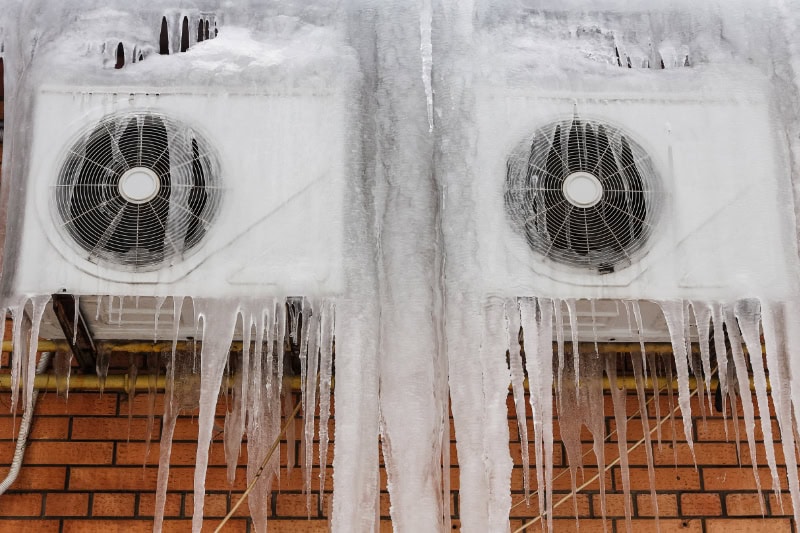Is Your Thermostat Causing Your AC to Freeze Up in Aledo?

The long Texas summer is fading in Aledo, and crisp mornings are starting to roll in. But before you swap your iced coffee for a pumpkin spice latte, you might notice something strange with your air conditioner-it’s acting a little too cold.
If you spot frost forming on your AC unit this fall, you’re not alone. A frozen air conditioner is a common issue as the seasons shift. And while there are several possible culprits, one often-overlooked troublemaker might be hanging right on your wall:
Your thermostat.
Our team at Glenn Aire created this guide to help you understand why AC freeze-ups happen, how your thermostat could be to blame, and what you can do to prevent it—so your system stays healthy heading into heating season.
Once ice forms, it blocks airflow and heat exchange, leading to:
- Little or no cool air: Ice buildup stops your system from properly cooling.
- Higher energy bills: Your AC works overtime to overcome the ice.
- Potential system damage: Prolonged freezing can cause stress or failure in key components.
If you’re seeing frost, don’t panic—Glenn Aire can quickly diagnose the problem and get your system back to normal
Common Causes of AC Freeze-Ups
While the ice is the obvious symptom, here are the usual suspects behind the freeze:
- Poor Airflow: Often due to a dirty air filter or blocked vents, preventing warm air from reaching the coil.
- Low Refrigerant: A leak can drop system pressure, cooling the coil below freezing.
- Mechanical Issues: Problems with the blower motor, dirty coils, or a stuck contactor can all trigger freezing.
- A Faulty Thermostat: That small device on your wall might be telling your system to run longer than necessary, leading to overcooling and ice buildup—especially on cooler fall nights.
How Your Thermostat Actually Works
Your thermostat is like your HVAC system’s brain. It senses your home’s temperature and signals your furnace or AC when to turn on and off to maintain comfort.
Modern thermostats use precise sensors to detect changes and adjust automatically. Smart models can even learn your habits and fine-tune energy use. But when something goes wrong—like a bad sensor or stuck relay—it can send the wrong signals, keeping your AC running longer than it should.
When Good Thermostats Go Bad
A faulty thermostat can easily turn your AC into an ice maker. Here’s how:
Incorrect Wiring: If the thermostat was recently installed, a wiring error might cause erratic cooling cycles.
Inaccurate Temperature Readings: A broken sensor may think your home is warmer than it is, keeping the system running nonstop.
Stuck Relays: Mechanical parts can get jammed, forcing your AC to cool even after the target temperature is reached.
AC Frozen: Solutions and Prevention Tips
If you suspect your AC is frozen, the first crucial step is to turn off your system immediately. Running a frozen AC can cause further damage.
Allow several hours for the ice to melt completely. Don’t just change the filter and turn it back on; the ice inside the evaporator coil might still be substantial.
Once the unit has thawed, you can try to identify the cause. Here’s a breakdown of solutions and prevention tips:
AC Frozen Solutions:
- Check and Replace Your Air Filter: This is the easiest and often the first fix. A dirty filter restricts airflow, so replace it with a clean one (aim for every 1-3 months, especially during peak cooling season).
- Ensure Proper Airflow: Make sure your vents are open and not blocked by furniture or other objects.
- Address Low Refrigerant: This requires a professional HVAC technician. Do not attempt to add refrigerant yourself. A Glenn Aire technician can identify and repair any leaks and recharge your system.
- Repair Mechanical Issues: If you suspect a faulty blower motor, dirty coils, or a stuck contactor, call a qualified HVAC technician for diagnosis and repair.
- Troubleshoot Your Thermostat:
- Check the Batteries: If you have a battery-powered thermostat, try replacing the batteries.
- Inspect Wiring: If you’re comfortable and know what you’re doing, visually inspect the wiring connections. Loose or incorrect wiring can cause issues. However, if you’re unsure, it’s always best to call us.
- Consider Replacement: If your thermostat is old, malfunctioning, or constantly causing issues, it might be time for a replacement. A modern, properly functioning thermostat can improve efficiency and prevent future freeze-ups.
Preventing AC Freeze-Ups This Fall
As temperatures drop, it’s the perfect time for some HVAC TLC:
- Schedule Annual Maintenance: Fall is ideal for an AC checkup before winter. Glenn Aire can inspect your refrigerant, coils, and thermostat calibration.
- Avoid Setting Your Thermostat Too Low: In cooler weather, setting your AC below 68°F can cause overcooling and freezing.
- Keep Airflow Strong: Open vents and ensure your home’s air circulation is steady.
Stop searching, “Why is my AC freezing up?” Give Glenn Aire a call, and we can quickly assess the situation and recommend a practical solution that fits your budget!
Call for AC Repairs and Maintenance
If your thermostat—or any part of your HVAC system—isn’t behaving as it should, don’t hesitate to call Glenn Aire at 682-282-0992 or request service online for expert diagnosis and reliable solutions. We care for homes and businesses in Aledo, and throughout the greater area.
Need HVAC Service?
Contact the experts at Glenn Aire Co.
Call us at 817-736-1012!
